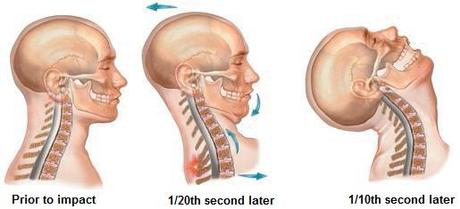 Whiplash is commonly associated with motor vehicle accidents, usually when the vehicle has been hit in the rear, but he injury can be caused by many other ways, including headbanging, bungee jumping and falls.
Whiplash is commonly associated with motor vehicle accidents, usually when the vehicle has been hit in the rear, but he injury can be caused by many other ways, including headbanging, bungee jumping and falls.
What is whiplash?
Whiplash, also called neck sprain or neck strain, is a soft tissue injury to the neck. Whiplash is characterized by a collection of symptoms that occur following damage to the neck. In whiplash, the intervertebral (located between vertebrae) joints, discs, and ligaments, cervical muscles, and nerve roots might become damaged.
What causes whiplash?
Whiplash is a disorder that commonly occurs as the result of an automobile accident or other sudden jolt of the head, causing soft tissue injury to the neck. Whiplash is caused by an abrupt jerking motion of the head, either backward or forward. The extent and type of injuries varies greatly.
What structures are injured in a whiplash?
Whiplash injuries most often result in sprain-strain of the neck. The ligaments that help support, protect, and restrict excessive movement of the vertebrae are torn, which is called a sprain. The joints in the back of the spine, called the facet joints, are covered by ligaments called facet capsules, which seem to be particularly susceptible to whiplash injury.
In addition, the muscles and tendons are strained—stretched beyond their normal limits. The discs between the vertebrae, which are essentially ligaments, can be torn, potentially causing a disc herniation. The nerve roots between the vertebrae may also be stretched and become inflamed. Even though it is very rare, vertebrae can be fractured and/or dislocated in a whiplash injury.

What are the symptoms of whiplash?
Symptoms of whiplash might be delayed for 24 hours or more after the initial trauma. However, people who experience whiplash might develop one or more of the following symptoms, usually within the first few days after the accident:
- Neck pain and stiffness
- Headaches
- Pain in the shoulder or between the shoulder blades
- Low back pain
- Pain or numbness in the arm and/or hand
- Dizziness
- Ringing in the ears or blurred vision
- Difficulty concentrating or remembering
- Irritability, sleep disturbances, fatigue
What do research studies show are the best treatments for whiplash?
A new study published in the Journal of Orthopaedic Medicine [1999;21(1):22-25] points out the superiority of chiropractic care for chronic whiplash patients.
The authors interviewed 100 patients with chronic whiplash symptoms, seven of which were “lost to follow up.” They were able to divide the remaining 93 patients into three symptom groups:
Group 1: patients with “neck pain radiating in a ‘coat hanger’ distribution, associated with restricted range of neck movement;
Group 2: patients with “neurological symptoms, signs or both in association with neck pain and a restricted range of neck movement”;
Group 3: patients who described “severe neck pain but all of whom has a full range of motion and no neurological symptoms or signs distributed over specific myotomes or dermatomes.” These patients also “described an unusual complex of symptoms,” including “blackouts, visual disturbances, nausea, vomiting and chest pain, along with a nondermatomal distribution of pain.”
The authors of the study found improvement in chronic symptoms in 26 of 28 patients (93%) following chiropractic treatment. “Our results confirm the efficacy of chiropractic, with 69 of our 93 patients (74%) improving following treatment.”
The authors also go on to say that “The results from this study provide further evidence that chiropractic is an effective treatment for chronic whiplash symptoms.”
Finding treatment for whiplash in Augusta GA
Properly diagnosing the symptoms associated with whiplash is critical, as well as properly administering treatment targeted to areas affected by a whiplash injury. Georgia Clinic of Chiropractic are experienced chiropractors in Augusta GA, who have provided whiplash-specific treatments to patients with resounding success. For instance, we have noticed that our whiplash patients can experience headaches, especially at the base of the skull, which is also a common symptom of whiplash. It is important to recognize the headache as a symptom of whiplash, as opposed to treating a patient specifically for the headache in of itself.
To find out if an experienced chiropractor in Augusta GA can be the right course of treatment for you, contact the friendly staff at Georgia Clinic of Chiropractic either by phone or online.
The Georgia Clinic of Chiropractic Blog is written by Dr. Mark Huntsman.
Augusta GA Chiropractors Georgia Clinic of Chiropractic provides customized chiropractic care to the Augusta GA, Martinez GA, and Evans GA communities. Visit our main website at www.georgia-clinic.com for customized chiropractic in Augusta GA.
Choose several options to schedule your appointment: call (706) 814-5053, use our online voicemail, or use our online form.
